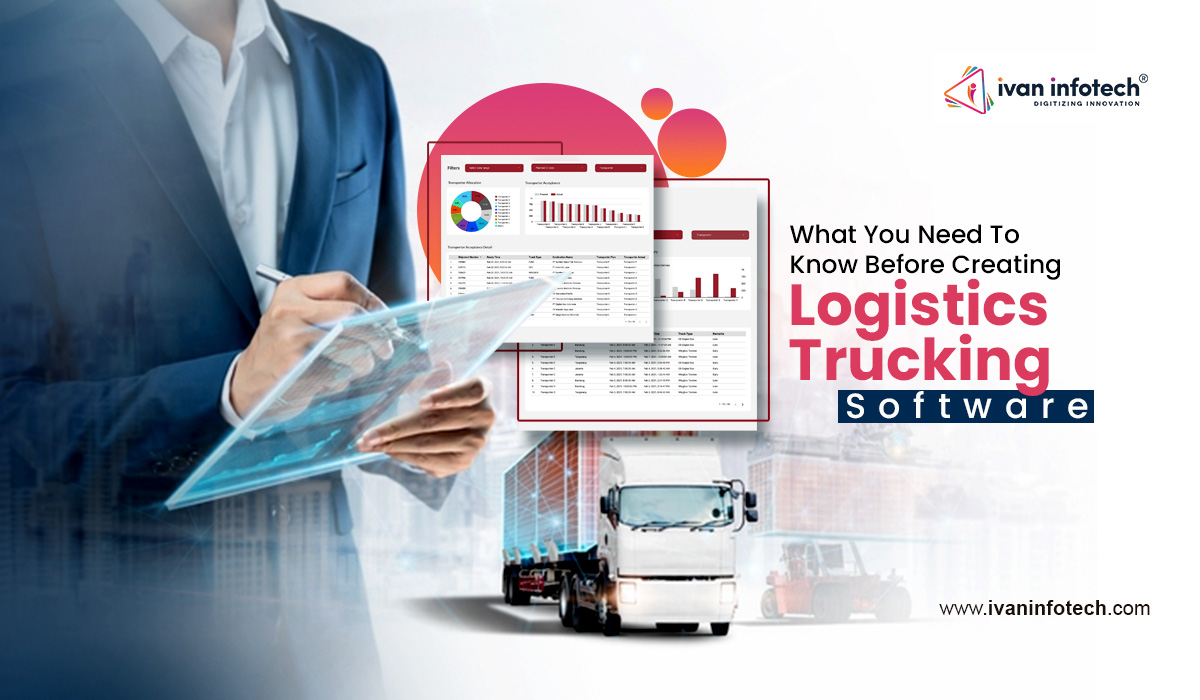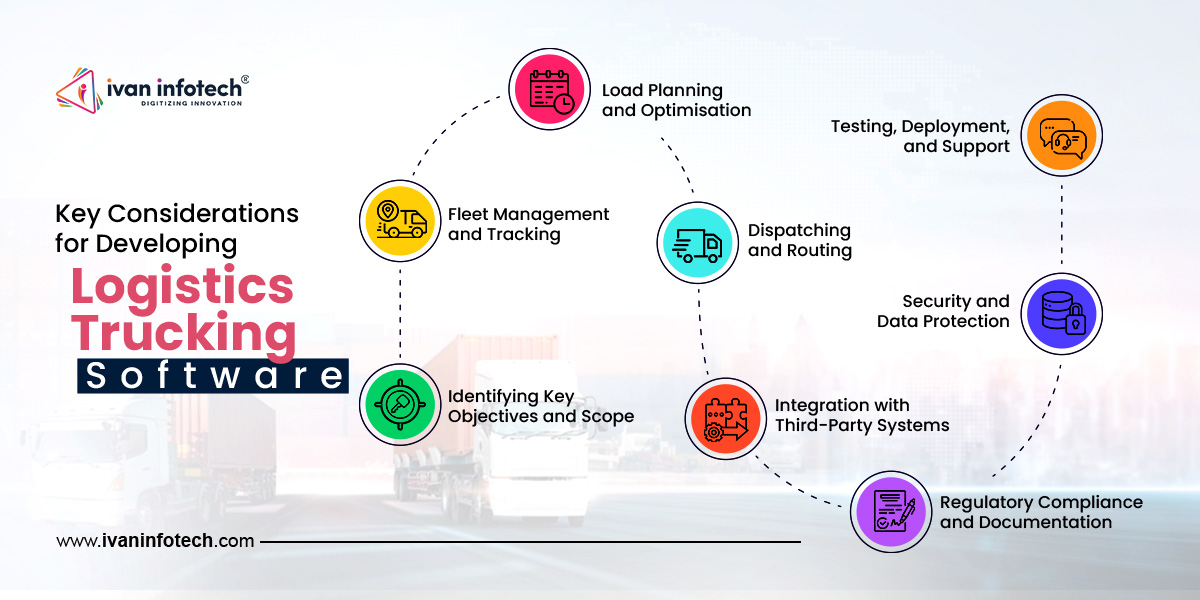
Importance of Logistics Software for Trucking
As experts in the field of transport and logistics trucking software development, we understand the critical factors that contribute to successful solutions in this industry. In this comprehensive guide, we will outline the key considerations you need to know before creating logistics trucking software. By addressing these aspects, you can develop a robust and efficient software solution that meets the specific needs of the trucking industry.
Common Doubts About Adopting Logistics Trucking Software
Opting for custom transportation software development involves a significant investment of time, resources, and capital. Businesses may be hesitant to allocate these resources without a guarantee of a substantial return on investment or if they perceive the software as too costly.
There may be concerns about the learning curve and employee resistance to change. Introducing new software often requires training and adaptation to new processes, which can disrupt existing workflows and potentially lead to temporary decreases in productivity.
Also, businesses may be cautious about data security and privacy. Transporting valuable goods involves sensitive information, such as customer data, shipment details, and financial records. Without robust security measures in place, there may be concerns about potential data breaches or unauthorised access.
The apprehensions surrounding logistics software for trucking are often related to the perceived costs, disruption to operations, data security, and past experiences. Addressing these concerns through transparent communication, comprehensive training, strong security measures, and reliable customer support can help alleviate businesses’ apprehensions and foster their adoption of logistics trucking software.
Understanding the Logistics Trucking Domain
Before embarking on custom transportation software development, it is vital to have a deep understanding of the industry. Familiarise yourself with the trucking and freight transportation ecosystem, including the roles of shippers, carriers, drivers, and brokers. Gain insights into industry-specific challenges, such as load optimization, driver management, dispatching, and regulatory compliance. Understanding the nuances of the logistics trucking domain will enable you to build software that effectively addresses industry pain points.
Key Considerations for Developing Logistics Trucking Software

Identifying Key Objectives and Scope
Clearly define the objectives and scope of your logistics trucking software project. Identify the specific challenges you aim to overcome or improvements you intend to make in trucking operations. For logistics software for trucking consider features such as load planning and optimisation, real-time tracking, route optimisation, freight brokerage, document management, and invoicing. Prioritise these features based on their impact and feasibility to ensure a focused and achievable development roadmap.
Fleet Management and Tracking
Efficient fleet management is a critical aspect of logistics trucking software. Develop features to manage and track the fleet effectively, including vehicle maintenance, driver assignments, fuel management, and real-time tracking of shipments. Integration with telematics systems and GPS technologies will enable you to gather accurate data for monitoring and optimising fleet performance. Consider integrating Electronic Logging Devices (ELDs) to ensure compliance with Hours of Service (HOS) regulations.
Load Planning and Optimisation
Load planning and optimisation capabilities are essential for maximising truck capacity and minimising costs. Develop algorithms that consider factors like load characteristics, weight restrictions, delivery schedules, and route optimization to create efficient load plans. Integration with freight marketplaces can help match available loads with carriers, streamlining the load planning process and reducing empty miles.
Dispatching and Routing
Efficient dispatching and routing are crucial for timely deliveries and minimising inefficiencies. Develop features that enable automated dispatching, taking into account factors such as driver availability, location, and load requirements. Implement routing algorithms that optimise routes based on distance, traffic conditions, and delivery time windows. Real-time updates and notifications for drivers and dispatchers can help ensure smooth operations and improved customer satisfaction.
Integration with Third-Party Systems
Seamless integration with third-party systems is vital in logistics trucking software. Integrate with industry-specific platforms such as transportation management systems (TMS), freight marketplaces, load boards, and electronic data interchange (EDI) systems. This integration facilitates data exchange, streamlines operations, and improves overall efficiency. Consider utilising APIs and standardised data formats to simplify integration efforts.
Regulatory Compliance and Documentation
Logistics trucking involves compliance with various regulations, such as HOS, International Fuel Tax Agreement (IFTA), and Electronic Data Interchange for Administration, Commerce, and Transport (EDIFACT) standards. Ensure that your software supports these compliance requirements and enables easy documentation management, including bills of lading, proof of delivery, and customs documentation. Implement features that automate compliance-related processes, reducing manual errors and streamlining operations.
Security and Data Protection
Security and data protection are paramount during custom transportation software development. Implement robust security measures to safeguard sensitive information, such as customer data, financial records, and operational data. Incorporate authentication mechanisms, data encryption, and role-based access control to ensure data confidentiality and integrity. Regularly update and patch your software to address potential vulnerabilities and stay ahead of evolving security threats.
Testing, Deployment, and Support
Thoroughly test your logistics trucking software throughout the development process to identify and rectify any issues. Plan for a phased deployment to minimise disruptions to ongoing operations. Provide comprehensive training and support to users during the transition. Maintain an agile approach to address user feedback, make iterative improvements, and ensure the software remains reliable, secure, and aligned with the evolving needs of the industry.
Developing logistics trucking software requires a deep understanding of the industry, a clear definition of objectives and scope, and a focus on fleet management, load planning, dispatching, integration, compliance, security, and testing. By considering these key factors, you can develop a comprehensive software solution that empowers logistics trucking companies to optimise their operations, enhance efficiency, and deliver exceptional service to their customers.
Subscribe to the Newsletter
Don’t lag behind in the ever-evolving age. Stay updated with all tech news and trends. We will not fill your inbox with spam mails. You will only receive updates about the cream contents.
Want Assistance with Software Development?
Anything you need in terms of software, you can count on us. With knowledge, skills and years of experience, we create tailor-made, integrated development solutions with high-end technologies.


Categories
Ai software solution
API Development Services
app development
Application Maintenance
AR And VR Software Development
AR Software Development
Artificial Intelligence
Asset Tracking
Automated system
Big Data
Block Chain Development
Blockchain Development Solution
cloud computing solutions
CMS Development Services
Construction Software Solution
CRM
custom web application
Digital Asset Management
Digital Marketing
Digital Services
Ecommerce Industry Solutions
ecommerce solution provider
Education Software Development
education software development Solution
Education Software Solution
ERP Software Development
Event Ticketing Software Solution
Finance Software Solution
Food and beverage software
Graphic Design
Healthcare software solution
hospitality software development solutions
hotel software solution
IMS
IOT
IT application development
IT Consultancy
IT services
IT solutions
Java
Java App Development
Lead Generation Services
Legal Software Development
mobile app design
opensource software development
pos software development Solution
Quality Assurance
Real estate software
Restaurant Software Solution
Retail IT Solutions
Retail Management Software
software development
Software Security
Software Testing
Sports Software Development
Supply Chain Software Solution
Transportation Software Development
Travel & Hospitality
UI and UX design
Uncategorized
Web Design
Web development service
Web Programming